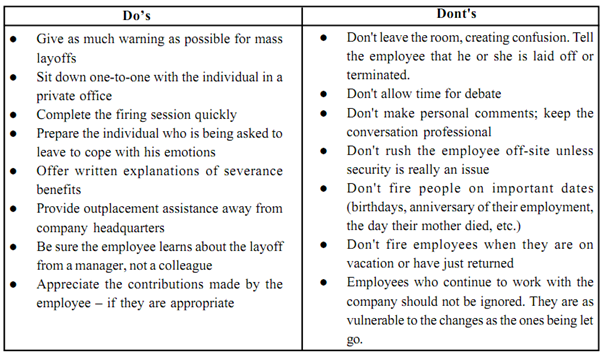Lay off
A layoff is a temporary base removal of an employee from the payroll of an organisation due to cause beyond the control of an employer. Global competition, changing technologies that decreases the need for workers, reductions in product demand, and acquisitions and mergers are the primary factors behind most layoffs. The services of the workers are not utilised during the layoff periods. If the layoff is for a provisional period (sometimes it might be the not for definite time) the worker is possible to be called back to join the ranks once again. Therefore the employer-employee relationship does not come to an end but is only suspended during the period of layoff. The reason of layoff is to trim the extra fat and make the organisation competitive and lean.
Under the Industrial Disputes Act, 1947, a lay-off implies the following things which are described below.
a) The employer is unable to employ some employees temporarily on a full-time basis.
b) The reason for the refusal of employment could be traceable to shortage of inputs, accumulation of stocks, power, breakdown of machinery etc.
c) During the period of lay off the employer-employee relationship stands suspended
d) The employee gets (excluding holidays) just fifty per cent of his normally eligible overall basic wages plus dearness allowance during the period of lay off.
e) To claim this compensation, the laid off workman (a) should not be a casual employee (b) his name ought to be there on the muster rolls (c) he must have one year's continuous service (d) he has to report for work at the appointed time at least once a day. However These conditions do not apply when (i) the worker is able to discover alternative employment in a nearby location (within 5 miles), (ii) the layoff is due to strike or slowing down of manufacture by workforces in another part of the establishment (iii) the industrial establishment is seasonal in character, and (iv) where normally less than 20 workers are employed therein.
Layoffs have a powerful influenced on the organisation. They bring down the morale of the organisation's remaining workers, who are forced to live in an environment of insecurity and uncertainty. Sometimes, even employees whose services might be essential for the organisation might quit fearing loss of membership - therefore causing further damage to the organisation. The company's standing as a nice place to work might suffer. It might be difficult for the company to have the services of talented people later. Therefore layoffs have to be carried out in a cautious way keeping the psychological, financial and social consequences in mind.
Consulting firms offer the advice for telling employees that they will be laid off which is described in box.
Box: The Do's and Don'ts of Laying off or Terminating Employees
